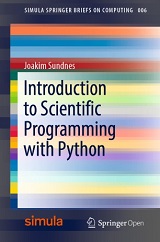
|
FreeComputerBooks.com
Links to Free Computer, Mathematics, Technical Books all over the World
|
|
- Title: Introduction to Scientific Programming with Python
- Author(s) Joakim Sundnes
- Publisher: Springer; 1st ed. (July 2, 2020); eBook (Creative Commons Licensed)
- License(s): Creative Commons License (CC)
- Hardcover: 164 pages
- eBook: PDF
- Language: English
- ISBN-10: 3030503550
- ISBN-13: 978-3030503550
- Share This:

|
This book offers an initial introduction to programming for scientific and computational applications using the Python programming language. The presentation style is compact and example-based, making it suitable for students and researchers with little or no prior experience in programming.
The book uses relevant examples from mathematics and the natural sciences to present programming as a practical toolbox that can quickly enable readers to write their own programs for data processing and mathematical modeling.
This book is open access under a CC BY license 4.0.
About the Authors- Joakim Sundnes is Chief Research Scientist at Simula Research Laboratory and teaches undergraduate programming at the University of Oslo.
- Python Programming
- Numerical Analysis and Scientific Computing
- Mathematical and Computational Software
 Similar Books:
Similar Books:
-
 Scientific Programming in C++17 and Fortran 2008 (V. Eijkhout)
Scientific Programming in C++17 and Fortran 2008 (V. Eijkhout)
This book covers the two major high performance languages: C++17 and Fortran 2008. Both are covered from the ground up, rather than encyclopedically, with plenty of programming examples, taken from computational science.
-
 Programming for Computations - Python 3 Edition
Programming for Computations - Python 3 Edition
This book outlines the shortest possible path from no previous experience with programming to a set of skills that allows students to write simple programs for solving common mathematical problems with numerical methods in the context.
-
 Scipy Lecture Notes (Emmanuelle Gouillart, et al)
Scipy Lecture Notes (Emmanuelle Gouillart, et al)
This book teaches the scientific Python ecosystem, a quick introduction to central tools and techniques. It is for programmers from beginner to expert. Work on real-world problems with SciPy, NumPy, Pandas, scikit-image, and other Python libraries.
-
 Computational Physics with Python (Eric Ayars)
Computational Physics with Python (Eric Ayars)
This book provides an unusually broad survey of the topics of modern computational physics. Its philosophy is rooted in learning by doing, with new scientific materials as well as with the Python programming language.
-
 From Python to NumPy (Nicolas P. Rougier)
From Python to NumPy (Nicolas P. Rougier)
NumPy is one of the most important scientific computing libraries available for Python. This book teaches you how to achieve expert level competency to perform complex operations, with in-depth coverage of advanced concepts.
-
 Solving PDEs in Python: The FEniCS Tutorial I (H. Langtangen)
Solving PDEs in Python: The FEniCS Tutorial I (H. Langtangen)
This book offers a concise and gentle introduction to finite element programming in Python based on the popular FEniCS software library. Using a series of examples, it guides readers through the essential steps to quickly solving a PDE in FEniCS.
-
 Python Scripting for Computational Science (Hans Langtangen)
Python Scripting for Computational Science (Hans Langtangen)
With a primary focus on examples and applications of relevance to computational scientists, this brilliantly useful book shows computational scientists how to develop tailored, flexible, and human-efficient working environments built from small scripts written in the easy-to-learn, high-level Python language.
-
 Guide to NumPy (Travis E. Oliphant)
Guide to NumPy (Travis E. Oliphant)
This book is for programmers, scientists, or engineers, who have basic Python knowledge and would like to be able to do numerical computations with Python. It will give you a solid foundation in NumPy arrays and universal functions.
-
 Python and OpenGL for Scientific Visualization (Nicolas P. Rougier)
Python and OpenGL for Scientific Visualization (Nicolas P. Rougier)
The goal of this book is to reconcile Python programmers with OpenGL, providing both an introduction to modern OpenGL and a set of basic and advanced techniques in order to achieve both fast, scalable & beautiful scientific visualizations.
-
 Scientific Visualisation: Python and Matplotlib (Nicolas P. Rougier)
Scientific Visualisation: Python and Matplotlib (Nicolas P. Rougier)
Matplotlib provides a large library of customizable plots, along with a comprehensive set of backends. Through practical, hands-on and straightforward examples, the book guides you through Data Visualization and Exploration using Python and Matplotlib.





